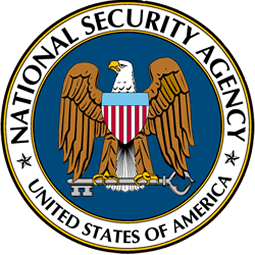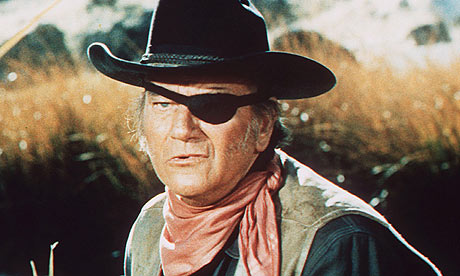Monday, June 10, 2013
Obama on NSA spying: "Was that wrong? Should I not have done that?"
An amusing thing about this NSA story is Barack Obama's response that he "welcomes" a debate about government surveillance. He has also said, "[w]e're going to have to make some choices as a society."
But of course, precisely the problem with the NSA program is that there could be no public debate because the whole thing was steeped in secrecy. The only reason we're having the debate now is because the whole program was leaked by a whistleblower--a whistleblower that Obama will almost certainly prosecute to the fullest extent of the law.
The whole thing reminds me of when George got busted for having sex with the cleaning lady at work.
True grit
For a long time I've had the concern that the primacy of the standardized test in American education, while perhaps doing a good job of identifying the most analytically intelligent, might also have the perverse effect of admitting a certain unfavorable personality type into the nation's elite academic institutions. The personality type I have in mind is that of the sort of person who does well at standardized tests: intelligent and thoughtful, yes, but also obedient, seeking validation from authority figures, and conformist.
What is problematic about this for society is that since elite academic institutions feed our public institutions, there gets to become a culture of groupthink that can lead to disastrous institutional failures. If you have a newsroom culture that systematically defers to authority, then the government can get away with waging a baseless war. If you have an office culture in a financial firm in which dissent is punished or ignored, then the firm will go bankrupt investing in a housing bubble.
What is required to run the world is not just intelligence, but grit--the courage and the will to place one's own principles and dignity above money and status and the rebuke of authority figures. But a person who spends a lifetime dutifully completing school assignments and taking exam prep courses is not likely to have the history of failure, rejection, and hardship that builds character.
So I was not too surprised to see that the leaker of the NSA spying programs, Edward Snowden, is not a graduate of an elite university but has had something of an uneven history:
What is problematic about this for society is that since elite academic institutions feed our public institutions, there gets to become a culture of groupthink that can lead to disastrous institutional failures. If you have a newsroom culture that systematically defers to authority, then the government can get away with waging a baseless war. If you have an office culture in a financial firm in which dissent is punished or ignored, then the firm will go bankrupt investing in a housing bubble.
What is required to run the world is not just intelligence, but grit--the courage and the will to place one's own principles and dignity above money and status and the rebuke of authority figures. But a person who spends a lifetime dutifully completing school assignments and taking exam prep courses is not likely to have the history of failure, rejection, and hardship that builds character.
So I was not too surprised to see that the leaker of the NSA spying programs, Edward Snowden, is not a graduate of an elite university but has had something of an uneven history:
...he never completed his coursework at a community college in Maryland, only later obtaining his GED — an unusually light education for someone who would advance in the intelligence ranks.Even if you disagree with Snowden's actions on the merits, I think everyone can acknowledge that risking his entire life and giving up everything for something he believed in was an act of courage, an act that requires true grit.
Sunday, June 9, 2013
What kind of surveillance state do we want?
 |
| A bald eagle on a fucking KEY |
provocatively argues that “[t]he question is not whether we will have a surveillance state in the years to come, but what sort of state we will have.”
The professor distinguishes between authoritarian and democratic surveillance states:
What do authoritarian surveillance states do? They act as “information gluttons and information misers.” As gluttons, they take in as much information as possible....But authoritarian surveillance states also act as misers, preventing any information about themselves from being released. Their actions and the information they gather are kept secret from both the public and the rest of government.
...I think this is a pretty interesting approach to the problem. For example I've long thought about how the de facto decentralized surveillance enabled by the widespread distribution of video-capable phones has been overwhelmingly beneficial for our security--used against not only criminals, as in the Boston Marathon bombings, but also against our own government, as with the countless instances of police brutality that have been captured on video. Expanding in this direction seems to me a way of making a surveillance state compatible with democratic principles.
What would a democratic surveillance state look like? Balkin argues that these states would be “information gourmets and information philanthropists.” A democratic surveillance state would limit the data it collects to the bare minimum.... A democratic surveillance state would also place an emphasis on destroying the data that the government collects.
Critique of authoritarian surveillance
To me the sole advantage to be gained from the authoritarian model of the government keeping what it knows a secret is cases in which bad guys unwittingly divulge information because they don't know they are being spied upon. But to the extent that bad guys are suspicious of the government and careful not to communicate sensitive messages using technological means, that sole advantage is nullified. And meanwhile there are HUGE negatives with this approach, starting with the potential for abuse and blowback that occurs when the abuse is inevitably discovered--not to mention the moral issues of privacy and democratic accountability involved.
In the end, I don't think that waging a secret spy campaign is something that makes sense for America to do; it is simply not the kind of fight that suits the nation, its goals, and its ideals. An analogy might be made here between checkers and chess. In checkers, the goal is to destroy the opponent's pieces; in chess, it is to trap the opponent's king. With a "daylight" model--or democratic surveillance state--where the US makes the extent of its spying publicly known and accountable, the enemy would know exactly the capabilities of US spying and would therefore avoid certain kinds of communication. But while this would make them difficult to apprehend, it would also significantly inhibit their ability to wage terrorism. So though we may not be able to eliminate them from the board, we could still "trap" them into a limited space, capabilities-wise.
Rather than making the primary goal eliminating terrorists, we would be focusing on making terrorism hard to do. And we would get to keep the legitimacy of our government in the bargain.
Subscribe to:
Posts (Atom)
